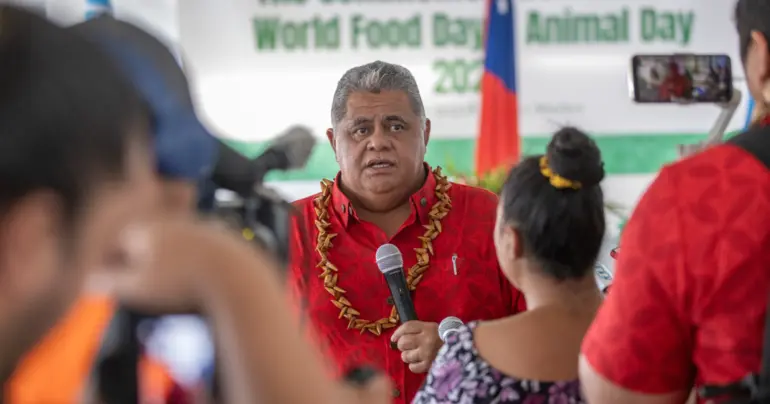Deputy P.M. questions cannot linger
 By The Editorial Board
•
22 September 2020, 11:40PM
By The Editorial Board
•
22 September 2020, 11:40PM
The question of the Prime Minister, Tuilaepa Dr. Sa'ilele Malielegaoi’s, decision to assume the role of the Deputy Prime Ministership for himself may not have much practical consequence.
At Tuesday’s sitting of Parliament we saw that the position of sitting next to the Prime Minister, Fiame Naomi Mata’afa, was replaced with the quickest efficiency.
With all but the title bestowed upon him, Minister Tuitama Dr. Leao Tuitama, served Tuilaepa as an enthusiastic lieutenant; a microphone accidentally picking up an order from the Prime Minister to the Minister to move a motion showed as much.
After all there is very little Parliament left between now and the election anyway, even accounting for the emergency sitting that began on Tuesday.
There is precious little left before Parliament rises for the final time in November. And next year it will sit only in January, three months before the election.
So the absence of the Deputy Prime Minister is not likely to show the Government under any strain, especially with all the distractions of the elections the coming months are sure to provide.
Rather it is one of legitimacy.
And that that will loom large over Tuilaepa’s Government until election day.
The constitutional questions are complex.
But as the Hong Kong University expert in Samoan Law, Dr Anna Dziedzic says, It all comes down to Article 32 (b.a) of the constitution and how it might be interpreted.
The relevant clause says that the Head of State shall [...] appoint a Deputy Prime Minister.”
It does not say the Head of State may, might or could possibly appoint a Deputy Prime Minister or any similarly imprecise language.
That very much makes it appear as though there must be a Deputy Prime Minister.
But to give the Prime Minister his due a counter argument could be raised that the appointment of the position will be conducted “on the advice” of the Prime Minister.
Tuilaepa’s camp could argue that gives him the leeway to not appoint anyone at all.
But let us take that logic to its logical conclusion.
Dr Dziedzic notes the very previous clause of the constitution says that the Head of State, acting on the advice of the Prime Minister, shall (there’s that word again) appoint “not fewer than eight nor more than twelve other Members of Parliament to be Ministers”.
It seems to follow that if you believe in Tuilaepa’s position about the non-appointment of the Deputy Prime Minister you must also believe the same thing about the cabinet.
That the framers of this country’s constitution also intend for a system that would allow for the Prime Minister to appoint himself to most of, if not all, the positions in Cabinet does not pass the laugh test.
And we believe it takes us into murky territory where a Constitution clearly designed to prevent the country from being run as a one-man band is being tested.
That alone should make us nervous.
But finer legal minds than we have shared similar concerns.
Former District Court Judge, Lefau Harry Schuster, says the position of Deputy Prime Minister is a compulsory appointment under the Constitution and should be filled at all times.
Failure to fill the position is "not following the letter of the law and the Constitution," he said.
“In my view the importance of the position is that it’s enshrined in the Constitution to guarantee that there is no vacancy and gap in the top leadership that is the deputy P.M.,” said Lefau.
“They proposed the law that is now in the Constitution and everyone should follow the rule of law in this case is the appointment of the deputy [P.M.] the Constitution.”
Tuilaepa has drawn himself in for some criticism recently when discussing the intentions and understanding of the framers of the constitution when he argued in favour of amending the Land and Titles Court (L.T.C.).
The descendants of the many honourable matai who crafted this nation’s foundational document protested their offence at the Prime Minister’s words.
Member of Parliament for Salega East, Olo Fiti Vaai, suggests the Prime Minister’s reasons are political and that he does not want to cause tensions within the ruling party before April’s election.
We don’t know if this is the Prime Minister’s thinking.
But what we do know is there can nothing be more important to Samoa than a constitutional Government.
The question should have been settled before Tuilaepa appointed himself.
But now that it has been done it must be established whether the Prime Minister was right to act as he did.
We invite Tuilaepa to share with us the legal advice which we received that advised him that he was acting within the boundaries of the constitution when he appointed himself to the Prime Minister.
Because no matter how short it lasts, a period where the Government of Samoa ignored the constitution will forever leave a mark on this nation’s history.
 By The Editorial Board
•
22 September 2020, 11:40PM
By The Editorial Board
•
22 September 2020, 11:40PM










